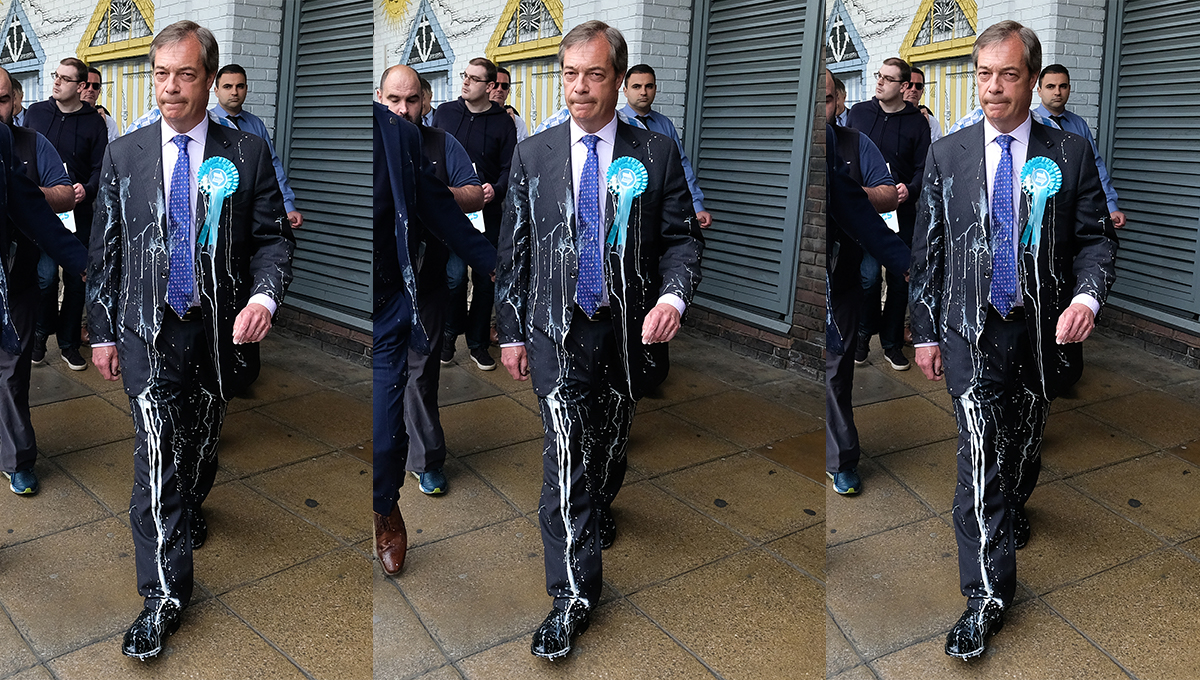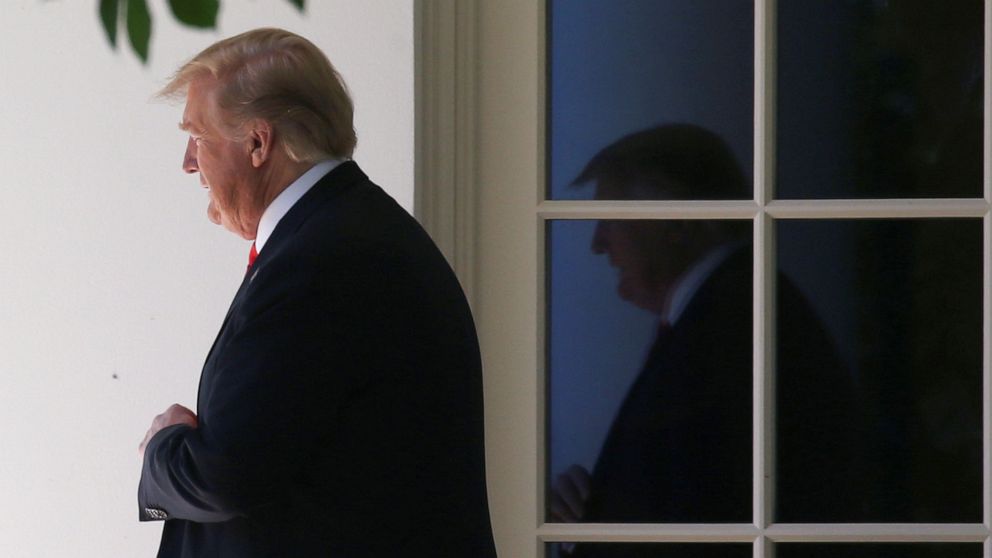Brexit Party leader Nigel Farage speaks to the media as he stands with newly elected Brexit Party MEPs, including Dr David Bull (L) and Ann Widdecombe (R) at a Brexit Party event on May 27, 2019 in London, England.
Peter Summers/Getty Images
The elections that were never supposed to happen have delivered the result that Britain’s two leading parties feared: The Conservatives and Labour, which have dominated British politics since the 1920s, both received a thumping, while parties with a clear position on Brexit thrived.
When the results of the European elections that were held in Britain on Thursday were announced starting Sunday night (counting was delayed until all of the 28 EU member states had finished voting), the Brexit Party appeared to be the big winner. With all but Northern Ireland counted, the Brexit Party won 31.6 percent of the total votes, securing 29 of UK’s 73 seats in the EU Parliament.
Although the Brexit party was formed just six weeks ago, after Theresa May secured an extension to Britain’s exit date, meaning that Britain would have to take part in the EU elections, it is led by a familiar face. Nigel Farage, who as leader of UKIP, the United Kingdom Independence Party, may have been the single most important anti-EU figure in the runup to the 2016 referendum, left his former party in December 2018, after its xenophobia and Islamophobia became less coded. His new party took advantage of UKIP’s drift toward extremism. UKIP’s share of the vote shrank from 26.6 percent in 2014 to just 3.3 percent, and it lost all of its 24 seats. (Alt-right populist Tommy Robinson gained no traction with voters in North West England—taking just 2.2 percent of the vote, despite attracting approximately 95 percent of the local media coverage.)
The Brexit Party didn’t just take over UKIP’s votes, though.
Labour lost 10 MEPs and saw its share of the vote shrink by 11.3 percent, while the Conservatives went from 19 to just 4 MEPs, losing nearly 15 percent of its vote share and doing worse than the Green Party. Given this drubbing, it seems clear that in this very peculiar election, voters were making a statement about how the two main parties have handled Britain’s departure from the EU. But that statement wasn’t necessarily in favor of Brexit.
While traditional Labour or Conservative voters who favor leaving the EU may have switched their allegiance to the Brexit Party, those who favor staying in also changed their voting patterns. Pro-EU parties who favor a second referendum did well—the Liberal Democrats went from just one to 16 MEPs, the Green Party added three for a total of seven, while the Scottish National Party and Welsh nationalists Plaid Cymru also did better than in 2014. As the Guardian observed, “the share of the two unambiguously pro-Brexit parties—the Brexit party and Ukip—was 34.9%, markedly lower than the aggregate total of the pro-second referendum parties (the Lib Dems, Greens, Change UK, the Scottish National party and Plaid) at 40.3%.”
What does all this mean?
The Brexit process is now even more likely to remain a confusing and chaotic mess. (Surprise!) The Labour Party’s takeaway from the election results was that it needs to be clearer about its stance on Brexit. On Sunday night, early in the BBC’s election coverage, shadow Foreign Secretary Emily Thornberry not only called for another public referendum on EU membership but said Labour should campaign to remain. Thornberry admitted, “We were not clear on the one single thing that people wanted to hear.”
In 2016—and ever since—the opposition party’s policy on Brexit has been surprisingly difficult to parse, in part because its supporters are divided. Many traditional Labour strongholds, especially in the North and Midlands, support Brexit, while London, its other power center, strongly favors remaining. Unambiguous support for staying in the European Union is a policy that could cause many working-class Northern and Midlands voters to desert the party.
The Conservatives, meanwhile, were too busy licking their wounds to say much at all. Prominent Conservative Brexiteer Daniel Hannan conceded that EU 2019 was “the worst result my party has suffered in its 185-year history,” but he added that “you don’t need to be any kind of expert on politics” to understand why: “People voted Leave and we haven’t left.”
The establishment parties are right to be worried.
Pre-election TV coverage was full of interviews with prominent lifelong Conservatives who had abandoned the party over Europe. Referendums often leave disruption in their wake. Just look at Scotland: Labour’s opposition to Scottish independence in the 2014 referendum seems to have severed many Scots’ tribal affiliation with the party. In the general election the following year, Labour lost 40 of its 41 Scottish seats to the Scottish National Party. (It regained six of them in 2017.) This week, for the first time, Labour didn’t elect a single MEP in Scotland. If the Brexit referendum alienates working-class Notherners and Midlanders from the Labour Party, the consequences could be devastating.
As was the case on Friday, when Prime Minister Theresa May announced her imminent departure and aspirants for her job started to lay out their policy stalls, Conservatives on all sides of Brexit agree that Parliament will never pass May’s withdrawal plan, but no one has offered specific ideas for what should or could take its place. Once again, the “debate” is over whether leaving without a deal—that is, exiting the EU on Oct. 31 without making any arrangements around trade, the Irish border, or any of the other complicated elements in the divorce settlement—would be totally disastrous or a “big economic boost.”
On Monday, politicians from across the political spectrum were trying to decode the messages voters were trying to send. It’s that we should leave now, said the Brexiteers. It’s that we should vote again, said the remainers. One way to resolve this confusion would be to conduct another general election before the next scheduled vote in May 2022. Under normal circumstances, a disastrous election performance by a deeply divided, leaderless ruling party would be likely to trigger a general election, but given its own dismal results, the opposition Labour Party has no incentive to push for an early election. Because the EU elections use a different proportional-representation voting system, and because voters care much less about the European Parliament and are thus more willing to cast protest votes, last week’s election can’t be directly compared to a “regular” vote. If there was a general election tomorrow, Nigel Farage wouldn’t become prime minister—despite leading two different parties to astonishing results in European elections, he has failed in each of his seven attempts to win a seat in Parliament. Still, neither of the main parties wants to test if eighth time’s the charm.
Help us continue covering the news and issues important to you—and get ad-free podcasts and bonus segments, members-only content, and other great benefits.
Join Slate Plushttps://slate.com/news-and-politics/2019/05/britain-eu-elections-brexit-party.html
2019-05-27 17:55:00Z
52780303659797







